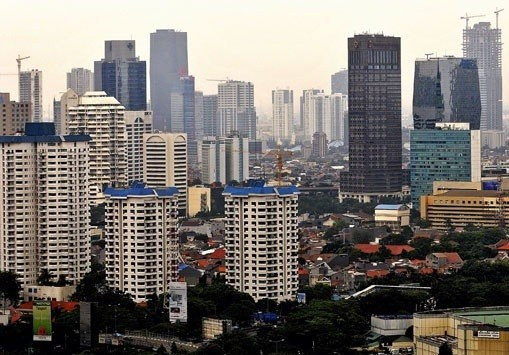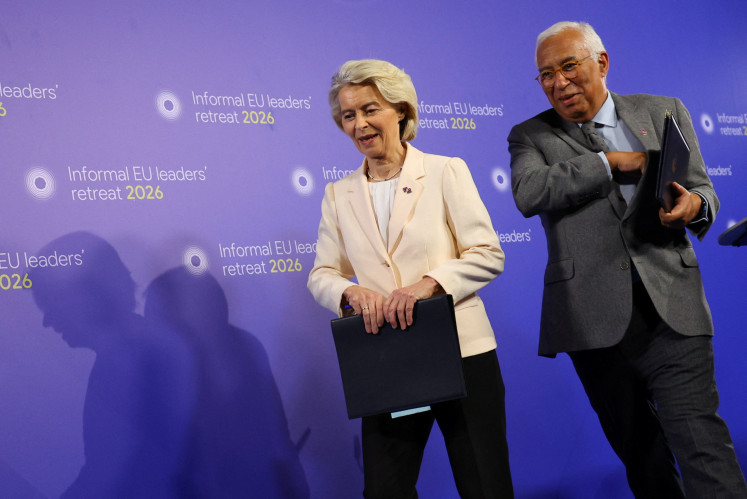Popular Reads
Top Results
Can't find what you're looking for?
View all search resultsPopular Reads
Top Results
Can't find what you're looking for?
View all search resultsIndonesia's balance of payments surplus signals stable external resilience
Change text size
Gift Premium Articles
to Anyone
I
ndonesia's external resilience remains intact amid ongoing global risk, reflected by the surplus in the country’s international transactions. According to a Bank Indonesia (BI) report, Indonesia’s balance of payments (BOP) for Q3-2024 recorded a surplus of US$5.9 billion, a recovery from a deficit of $0.6 billion in Q2-2024.
Reduction in current account deficit
The surplus was driven by improvements in several indicators, one of which is the reduction in the current account deficit to $2.2 billion (0.6 percent of gross domestic product), which is better than the $3.2 billion deficit (0.9 percent of GDP) recorded in Q2-2024. This positive development was influenced by a decrease in the services account deficit, from $5.1 billion to $4.2 billion, primarily because of an increase in revenue from travel services, with more foreign visitors coming to Indonesia for international events and the summer holiday season.
In addition to the services account performance, the reduction in the current account deficit was also supported by an improvement in the primary income account deficit, which decreased to $8.9 billion from $9.6 billion, because of a decrease in payments for direct investment and portfolio investment income, in line with the business cycle. Other positive performance indicators include an increase in the secondary income account surplus to $1.6 billion from $1.5 billion, driven by higher government grant receipts and remittances from Indonesian migrant workers (PMI).
Increase in capital and financial account surplus
Furthermore, the BOP surplus was also fueled by an increase in the capital and financial account surplus to $6.6 billion (1.8 percent of GDP), up from $3.0 billion (0.9 percent of GDP) in Q2-2024. This positive development was influenced by a higher surplus in direct investment, which increased to $5.2 billion, driven by substantial foreign equity investment, especially in the processing industry, mining and quarrying sectors, as well as wholesale and retail trade. Additionally, the increase in portfolio investment surplus to $9.6 billion, derived from the purchase of long-term instruments such as rupiah-denominated government bonds and global government bonds, as well as short-term instruments like Sekuritas Rupiah Bank Indonesia (SRBI), also contributed to the growth in the capital and financial account surplus.
Increase in foreign exchange reserves
The surplus in the BOP also positively impacted Indonesia's foreign exchange reserves. Reserves increased to $149.9 billion at the end of September 2024, equivalent to 6.4 months of imports and government external debt payments, and above the international adequacy standard of around 3 months of imports.
Strategic government policies
As part of efforts to maintain external resilience amid global pressures, such as the strengthening of the United States dollar index affecting Indonesia's financial market volatility, the government has implemented strategic policies to reduce exchange rate vulnerability by enhancing the use of local currencies in bilateral transactions. The implementation of Local Currency Transaction (LCT), an expansion of Local Currency Settlement (LCS), plays a vital role in facilitating trade and investment between countries by reducing dependence on specific foreign currencies. This initiative is expected to support financial market deepening and exchange rate stabilization.
“To optimize the use of LCT, the government, together with Bank Indonesia, has formed the National LCT Task Force, aimed at increasing LCT usage to 10 percent in 2024 and 2025,” Coordinating Economic Minister Airlangga Hartarto said. This effort is further supported by socialization and incentives for businesses, exporters, importers and state-owned enterprises (SOEs) to encourage active involvement in economic stabilization through this policy. With various strategies in place, the government is committed to maintaining national economic resilience amid the dynamics of the global economy.
Additionally, the government continues to strengthen economic cooperation in various forums as part of efforts to improve access to Indonesian export products and attract foreign investment to bolster external sector resilience and maintain a BOP surplus. Indonesia's partnership with the Indo-Pacific Economic Framework (IPEF) countries has resulted in concrete steps to expand markets through resilient global supply chains, facilitate clean economies and ease investment. Efforts toward OECD accession are also ongoing to encourage reforms in line with the standards of developed nations, which is expected to enhance investment attractiveness and strengthen Indonesia’s position globally.
Looking ahead, BI forecasts that the 2024 BOP will continue to grow positively, with the current account deficit remaining within a low range of 0.1 to 0.9 percent of GDP. Considering these positive achievements and projections, the government will continue to work on maintaining the development of the BOP amid global economic dynamics, strengthening policies and coordination among stakeholders. (d1/dft/fsr)
This article was published in collaboration with Coordinating Ministry for Economic Affairs Republic of Indonesia











